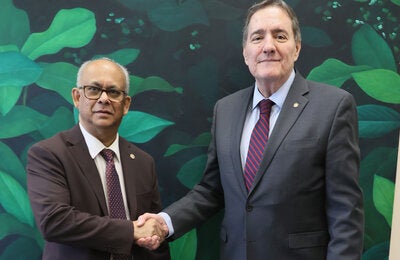
Washington DC, July 14, 2021 (PAHO) - Experts from Latin America and Europe participate in the “Development in Transition: Dialogues to chart new paths for Latin America and The Caribbean” to discuss the most relevant actions and policies that countries have developed from the first level of care (FLC) to respond to the COVID-19 pandemic, and to determine post-COVID strategic priorities for a sustainable and inclusive recovery of health systems.
The Conference consists of a series of discussions that will take place in July and are organized by the Development Center of the Organization for Economic Cooperation and Development (OECD), with the support of the European Commission and regional organizations such as the Pan American Health Organization and Economic Commission for Latin America and the Caribbean. The initiative seeks to contribute, through assessments and debate, to the configuration of new development models for a sustainable and inclusive recovery in Latin America and the Caribbean (LAC).
At the seminar on "Pandemics and the role of primary health care," held on 7 July 2021, experts discussed the actions that the first level of care developed to monitor and contain the spread of the pandemic, address the symptoms of COVID-19 proactively, and maintain routine care during the pandemic. Amalia Del Riego, Health Services and Access Unit Chief, PAHO/WHO, presented on “Setting the stage for primary health care and essential post-pandemic public health functions.”
“Health systems should facilitate and accelerate (1) the recovery of the lost achievements of public health, addressing the inequities of the impact of the pandemic; (2) the expansion of health access and coverage, with a focus on equity; and (3) improve preparedness and response to future multi-hazard emergencies, particularly pandemics,” said Del Riego.
Del Riego addressed four actions necessary to strengthen health systems: transform systems based on PHC; strengthen public health capacities through essential public health functions; strengthen the capacity of integrated health services networks; and increase public financing for health and social protection. Being better prepared to face future health emergencies requires adequate investments and adequate policy reforms to expand the resolution capacity of the first level of care.
These actions are critical not only to ensure that populations remain protected in the event of future public health emergencies but also to advance towards universal access to health and universal health coverage in the Americas.



